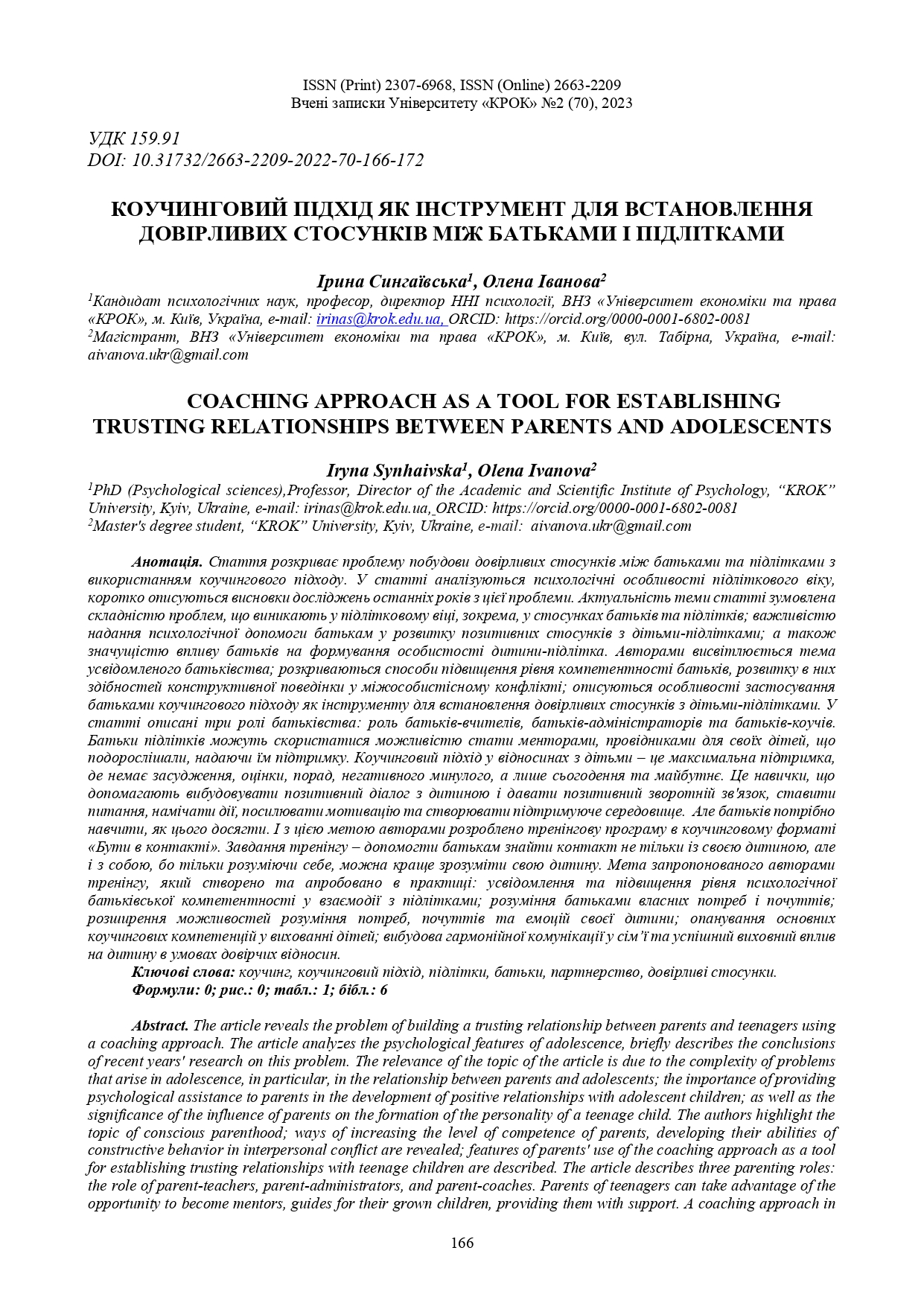COACHING APPROACH AS A TOOL FOR ESTABLISHING TRUSTING RELATIONSHIPS BETWEEN PARENTS AND ADOLESCENTS
DOI:
https://doi.org/10.31732/2663-2209-2022-70-166-172Keywords:
coaching, coaching approach, teenagers, parents, partnership, trusting relationshipAbstract
The article reveals the problem of building a trusting relationship between parents and teenagers using a coaching approach. The article analyzes the psychological features of adolescence, briefly describes the conclusions of recent years' research on this problem. The relevance of the topic of the article is due to the complexity of problems that arise in adolescence, in particular, in the relationship between parents and adolescents; the importance of providing psychological assistance to parents in the development of positive relationships with adolescent children; as well as the significance of the influence of parents on the formation of the personality of a teenage child. The authors highlight the topic of conscious parenthood; ways of increasing the level of competence of parents, developing their abilities of constructive behavior in interpersonal conflict are revealed; features of parents' use of the coaching approach as a tool for establishing trusting relationships with teenage children are described. The article describes three parenting roles: the role of parent-teachers, parent-administrators, and parent-coaches. Parents of teenagers can take advantage of the opportunity to become mentors, guides for their grown children, providing them with support. A coaching approach in relationships with children is maximum support, where there is no condemnation, evaluation, advice, negative past, but only the present and the future. These are skills that help build a positive dialogue with the child and give positive feedback, ask questions, plan actions, increase motivation and create a supportive environment. But parents need to be taught how to achieve this. And for this purpose, the authors have developed a training program in the coaching format "Being in contact". The task of the training is to help parents find contact not only with their child, but also with themselves, because only by understanding yourself can you better understand your child. The purpose of the training proposed by the authors, which was created and tested in practice: awareness and improvement of the level of psychological parental competence in interaction with teenagers; parents' understanding of their own needs and feelings; expanding the possibilities of understanding the needs, feelings and emotions of your child; mastering basic coaching competencies in raising children; building harmonious communication in the family and successful educational influence on the child in terms of trusting relationships.
Downloads
References
Сингаївська І.В., Федорець С. Б. Підлітковий вік як один із критичних періодів психосексуального розвитку людини. Вчені записки Університету «КРОК», 2022. № 4 (68). С. 107–114.
Войтенко Н. Потенціал людського мозку : електр. журн. Збруч, 2021. 10.02. https://zbruc.eu/node/103208
Crone E. The Adolescent Brain Changes in learning, decision-making and social relations : Routledge, 2016. 156 р.
Blakemore Sarah-Jayne. The mysterious workings of the adolescent brain : conf. TEDGlobal, 2012. june https://www.ted.com/talks/sarah_jayne_blakemore_the_mysterious_workings_of_the_adolescent_brain
Сингаївська І.В., Хохліна І.В. Психологічні особливості самооцінки дітей підліткового віку. Держава, регіони, підприємництво: інформаційні, суспільно-правові, соціально-економічні аспекти розвитку: тези доповідей ІІ Міжнародної конференції (Київ, 20 листопада 2020 р.). К.: Університет "КРОК", 2020. С. 90–92. https://conf.krok.edu.ua/SRE/SRE2020/paper/view/159
Sterling Diana. The Parent as Coach : White Oak Publishing, 2008.133 р.

Downloads
Published
How to Cite
Issue
Section
License

This work is licensed under a Creative Commons Attribution-NonCommercial 4.0 International License.

